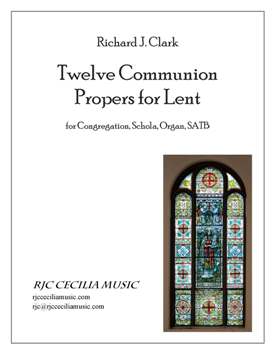Free Download:
 PDF • “Twelve Communion Propers for Lent” (for Schola, Organ, SATB)
PDF • “Twelve Communion Propers for Lent” (for Schola, Organ, SATB)
• Includes settings from Ash Wednesday and each Sunday of Lent though Palm Sunday. Also included are the multiple settings for Sundays three, four, and five, appropriate for the various cycles of readings and scrutinies for RCIA.
• All are chant based/inspired.
• Can be sung with cantor or schola only; there is enormous opportunity for SATB singing, designed to offer contrast with unison singing.
• Congregation inserts for worship aids found after page 25
• Antiphon texts are English translations of those found in the Graduale Romanum. (You will find some variation with the Communion propers found in the Roman Missal. An extraordinary article regarding Antiphons in the Roman Missal vs. the Roman Gradual is written by Jeff Ostrowski.)
Singing the propers during mass is not only the first option indicated by the General Instruction of the Roman Missal, but a true gift and blessing irregardless. It is fitting that the first communion antiphon on Ash Wednesday is, “He who meditates day and night on the law of the Lord, shall bear fruit in due season.” (Ps. 1: 2b, 3b) This is our hope: that our meditation and prayer, put into action will bear great fruit that will last.
The texts of the mass propers are a treasure. They are a gift being rediscovered by our generation, right now. While it may take another generation for singing them to become common practice at the parish level, the mustard seed has been planted with strong roots taking hold. So many extraordinary composers are taking on the challenge of bringing the mass propers into common practice: Kevin Allen, Adam Bartlett, Heinrich Isaac, Fr. Columba Kelley, Chris Meuller, Jeff Ostrowski, Gary Penkala, Kathleen Pluth, Richard Rice, Christoph Tietze, Fr. Samuel Weber, Russell Weissmann, and many more. This list is only the beginning.
Furthermore, singing the psalm verses in between antiphons opens our hearts to live our lives within the liturgy. Undiscovered by many, psalmody fills the mass and therefore fills our daily lives, addressing our most human wants, needs, and desires, only as imperfect humanity can express. Yet we offer our imperfection to God and ask God to take on our sorrows, our suffering, our joys and our praise, just as the psalmists did. In this way, we can live the liturgy.